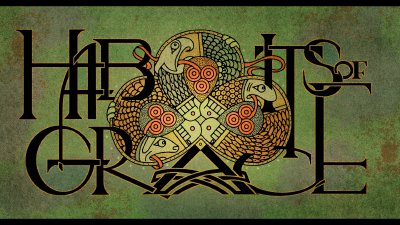I suppose we are fortunate: the first generation of humans to experience a pandemic in a digital age. I mean, there are now teenagers walking the earth (my house, even) who have never lived in a world without iPhones! We have apps for buying groceries and video chatting with grandmothers and managers, and can even glean insights from the greatest minds in the world. Unlike our forebears, we have countless robust ways to communicate and interact that don’t depend at all on close proximity. So, for us, quarantine and sheltering-in-place often only requires “creative logistical pivots” instead of all-out shut downs.
In his book Culture Making, author Andy Crouch talks about how every artifact of human design both makes new things possible, and at the same time makes old things impossible (or at least more difficult). The same technologies that help us overcome some of the limitations of our bodies also necessarily preclude activities that once assumed and even celebrated those limitations. Think about how difficult it is these days to know who suffered and sweated for your food, and how that fundamentally changes the way you can pray thanksgiving over it. As great as it is to have options for continued education and business, there are elements of life we can’t simply move online. And in a socially distanced reality, such activities are simply arrested.
Those for whom the pandemic has necessitated live-streaming worship know with HD clarity that some components of a worship service can work via livestream and others don’t at all. Sermons, for example, can be received over time and distance just like the Scriptures they unfold. Yet the Sacraments are embodied realities in a particular space and time. Baptism is the ritual washing of a person’s physical body as a sign and seal of what it means to be brought into the cosmic body of Christ. Holy communion is bread and wine consecrated as the broken body and blood of Christ received into the bodies of those who are Christ’s body.
This is the driving rationale behind why our Session has decided to continue offering our mask-only prayer and communion service at 8am on Sunday mornings as a complement to our 10:30 service of the Word and Table. We are grateful to live in an age where we can mitigate so many of the damaging effects of this pandemic, and yet we must acknowledge that there are also aspects of humanness that simply depend on gathering bodies. The need is therefore great to provide a place for those who are avoiding the bigger crowds to still have a space to experience the embodied means of grace that are so precious to the people of God. So, if you’ve been in the habit of only receiving the more digitally-transferrable aspects of worship these past many months, we ask you please also to avail yourselves of this opportunity, to round out your experience of worship. Also, please know that we continue to pray for an end to this disease and the destruction it wreaks physically, socially, and spiritually, and for each of you in particular. And until that day, we rest on His unchanging grace, made so near to us in these habits we share.
- josh

Sacraments: Heavenly Participation
October 3, 2021 • Rev. Joshua Smith • Hebrews 12:18–24
Hospitality-The Embodiment of Everything
November 7, 2021 • Rev. James M. Holland • Exodus 23:9, Deuteronomy 10:17–19, Matthew 25:31–40, Hebrews 13:1–3
Hospitality—The Embodiment of Everything! For Teri and me, our pilgrimage in the Mississippi Delta was perhaps the most formative time of our lives. We moved there while in seminary to do an internship in a church and then stayed on to plant a church in another city in the Delta. It was the first time we had experienced real and radical hospitality. It was never really practiced at either of the churches we grew up in. Here, however, it was lavish to say the least. From Yazoo City (where I served an internship for a year and a half) to Greenville (where I planted a church), folks literally took us by the hand and said, “Look!” Almost everything we now know about hospitality was found there—not so much taught as embodied in welcoming homes filled with the greatest food of our lives and people who genuinely acted like they wanted us there. In both places we showed up as outsiders—strangers to the customs, language, and cultural markers of a place. That is a lonely place to be. Granted, Teri and I had each other and a couple of kids, but that wasn’t enough. Who wants to be a stranger at every party or gathering? No, we all long for and were built for connection. That is, after all, what makes any place glorious—connection. We brought that with us from the Delta when we came to Collierville. Basically, Teri and I thought, “If we can build community here like we have known it, that will be enough.” For the building of that would embody everything we value about the gospel. And, of course, it would all start with hospitality. Our home would be open; our stuff would be used and possibly broken; it would be exhausting and also the most glorious thing we could imagine. This week we talk about the habit of hospitality and, yes, it is a habit. Without intentionally making room for people, you won’t. Unless it is a huge priority, you will never open your heart or your home in such a way that strangers become friends and know deep connection. Hospitality really does embody all of the values of St. Patrick. Were we to lose this habit of grace, all would be lost. But lest we think we have arrived, think again. Every time I look at the Bible, hospitality gets larger and larger. So, I hope you will join us Sunday as we talk about it. Oh, and remember~~FALL BACK! Daylight Savings Time is ending, and we get back an hour of sleep. (If you don’t, however, at least you will be on time!) Hope to see you Sunday, live and in person or via livestream. Blessings, Jim
When Helping Helps
October 31, 2021 • Rev. Joshua Smith • Luke 10:25–37
When Helping Helps As a college student at the turn of the century, I was bombarded with opportunities for activism. The biggest push at the time was a cause known as the Invisible Children, in support of Ugandan communities ravaged by the despotic terror of Joseph Kony and his Lord’s Resistance Army. Students were encouraged to watch a film, raise awareness, and fundraise support for… something. I’ll bet it was very clear and I’d imagine their efforts were even somewhat successful, though decades later the man still evades capture. For my own part, I was genuinely moved by that story – and I believe I tried to connect as best as I could – but I wasn’t really in a place where I was looking to give my life away to that cause. I did feel pretty guilty about it though, as I was getting serious about my faith and the consensus was that everyone should do, well, whatever it was that was being championed at the moment. I don’t know whether a general spirit of cynicism is replacing the optimistic activism I saw in that era of my life. Maybe worldwide concerted efforts didn’t produce the results we were all hoping for, and so now we know better. Or, maybe college students are still on a mission to save the world and my own guardedness is just a function of the age I am now versus the age I was then. What I do know is that often the way we engage in helping others can actually do harm to them and to us. This leads some folks to feel the same even about non-government organizations as they do about that other group of altruists. They say the most terrifying words in the English language are, “We’re from the government and we’re here to help.” And the poor’s posture in the meantime can be echoed by a recent blockbuster’s voiceover lament, “Who will our next oppressors be?” Some of us have a pathological need to help people. Others have a pathological need not to get involved. But Jesus’ posture toward his neighbors wasn’t pathological at all. It was healthy humanity. His way looks a bit less like an international revolution and a bit more like intimate restorations, (though one certainly does lead to the other). So, this Sunday I hope we can all learn from his story about the Good Samaritan, how we might recover some healthy habits of helping. Oh, and feel free to get a bit of practice in by volunteering to serve at our Fall Festival tomorrow! Sign up here - josh
Culture Making
October 24, 2021 • Rev. Joshua Smith • Genesis 11:1–9
The highlight of my year as a child wasn’t my birthday, or even Christmas. Those were in the top 5 for sure, along with summer camp and any break from school, but they simply couldn’t compete for the number one spot. That sacred place in my heart was reserved for one thing: The Morning Sun Annual Homecoming Barbeque. For a month or more leading up to that weekend in October, the whole church adopted a singular purpose: to turn our little chapel in the woods into the cultural epicenter of Shelby County. And it seems to me like we were successful in that. Everyone I knew was there, wiping tables or enjoying their second plate of BBQ, taking out the trash, listening to live bluegrass music, buying candy, or just running around with the pack of feral children terrorizing vendor tents. For one high holy day of the year, Heaven was local. Friday night before the BBQ, whoever was crowned “Boss” would gather his crew south of The Pit, run through the plan, and light The Fire (capitals to emphasize the sanctity of such mysteries). The pyre was built out of oaks felled from the property and set up on an iron grate so that when the coals fell, they could be shoveled directly into The Pit. All night long and into Saturday, the crew slowly and lovingly added smoke and vinegar-based sauce to their offering, in order to form our porcine ambrosia and send prayers of sweet incense to God Himself. You knew you were a Man when you were allowed to stay up all night with the pit crew around the fire, splitting wood, mopping hogs, and swapping stories. Let’s talk about The Pit for a minute. Back before I was born, some elder with a prophetic vision to rival Moses decided that before we built an education wing, our tiny congregation should erect a free-standing barbecue pit large enough to smoke ten whole hogs, right next to the sanctuary. I don’t know what that session meeting was like; whether there was pushback or debate about the prodigal cost and absurdity surrounding a single yearly event, but I know this: I will see that man in Glory. He did the Lord's work. To say that I am profoundly shaped by these experiences would be an understatement. I’d wager I learned more about the Kingdom of God from the Morning Sun BBQ than in any Sunday School lesson or even seminary class in my life. It’s an ebenezer in space and time of a particular community in a particular place, coming together and living out the values they shared with extravagant care and celebration. Out of it came artifacts of humanity such as a secret signature sauce, a sanctuary-sized BBQ pit, and an indelible rite of passage. We shaped a thing and it shaped us. That’s what culture is, and what it does, and God is pleased to bless it. Let’s talk more about all that on Sunday. - josh





